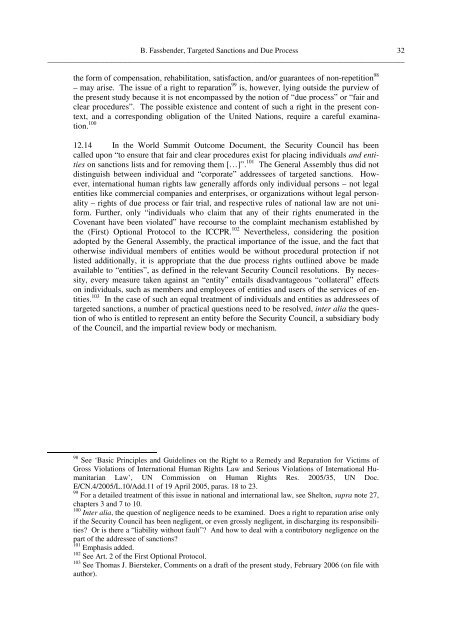Targeted Sanctions and Due Process - United Nations Treaty ...
Targeted Sanctions and Due Process - United Nations Treaty ...
Targeted Sanctions and Due Process - United Nations Treaty ...
You also want an ePaper? Increase the reach of your titles
YUMPU automatically turns print PDFs into web optimized ePapers that Google loves.
B. Fassbender, <strong>Targeted</strong> <strong>Sanctions</strong> <strong>and</strong> <strong>Due</strong> <strong>Process</strong><br />
32<br />
______________________________________________________________________________________________<br />
the form of compensation, rehabilitation, satisfaction, <strong>and</strong>/or guarantees of non-repetition 98<br />
– may arise. The issue of a right to reparation 99 is, however, lying outside the purview of<br />
the present study because it is not encompassed by the notion of “due process” or “fair <strong>and</strong><br />
clear procedures”. The possible existence <strong>and</strong> content of such a right in the present context,<br />
<strong>and</strong> a corresponding obligation of the <strong>United</strong> <strong>Nations</strong>, require a careful examination.<br />
100<br />
12.14 In the World Summit Outcome Document, the Security Council has been<br />
called upon “to ensure that fair <strong>and</strong> clear procedures exist for placing individuals <strong>and</strong> entities<br />
on sanctions lists <strong>and</strong> for removing them […]”. 101 The General Assembly thus did not<br />
distinguish between individual <strong>and</strong> “corporate” addressees of targeted sanctions. However,<br />
international human rights law generally affords only individual persons – not legal<br />
entities like commercial companies <strong>and</strong> enterprises, or organizations without legal personality<br />
– rights of due process or fair trial, <strong>and</strong> respective rules of national law are not uniform.<br />
Further, only “individuals who claim that any of their rights enumerated in the<br />
Covenant have been violated” have recourse to the complaint mechanism established by<br />
the (First) Optional Protocol to the ICCPR. 102 Nevertheless, considering the position<br />
adopted by the General Assembly, the practical importance of the issue, <strong>and</strong> the fact that<br />
otherwise individual members of entities would be without procedural protection if not<br />
listed additionally, it is appropriate that the due process rights outlined above be made<br />
available to “entities”, as defined in the relevant Security Council resolutions. By necessity,<br />
every measure taken against an “entity” entails disadvantageous “collateral” effects<br />
on individuals, such as members <strong>and</strong> employees of entities <strong>and</strong> users of the services of entities.<br />
103 In the case of such an equal treatment of individuals <strong>and</strong> entities as addressees of<br />
targeted sanctions, a number of practical questions need to be resolved, inter alia the question<br />
of who is entitled to represent an entity before the Security Council, a subsidiary body<br />
of the Council, <strong>and</strong> the impartial review body or mechanism.<br />
98 See ‘Basic Principles <strong>and</strong> Guidelines on the Right to a Remedy <strong>and</strong> Reparation for Victims of<br />
Gross Violations of International Human Rights Law <strong>and</strong> Serious Violations of International Humanitarian<br />
Law’, UN Commission on Human Rights Res. 2005/35, UN Doc.<br />
E/CN.4/2005/L.10/Add.11 of 19 April 2005, paras. 18 to 23.<br />
99 For a detailed treatment of this issue in national <strong>and</strong> international law, see Shelton, supra note 27,<br />
chapters 3 <strong>and</strong> 7 to 10.<br />
100 Inter alia, the question of negligence needs to be examined. Does a right to reparation arise only<br />
if the Security Council has been negligent, or even grossly negligent, in discharging its responsibilities?<br />
Or is there a “liability without fault”? And how to deal with a contributory negligence on the<br />
part of the addressee of sanctions?<br />
101 Emphasis added.<br />
102 See Art. 2 of the First Optional Protocol.<br />
103 See Thomas J. Biersteker, Comments on a draft of the present study, February 2006 (on file with<br />
author).
















